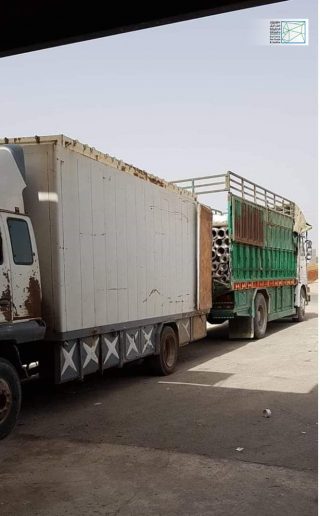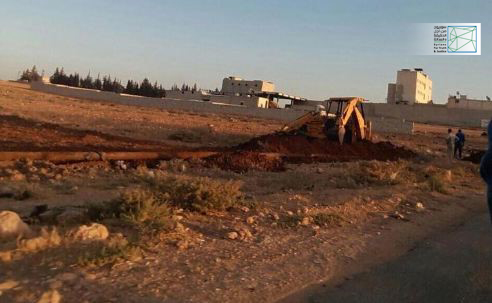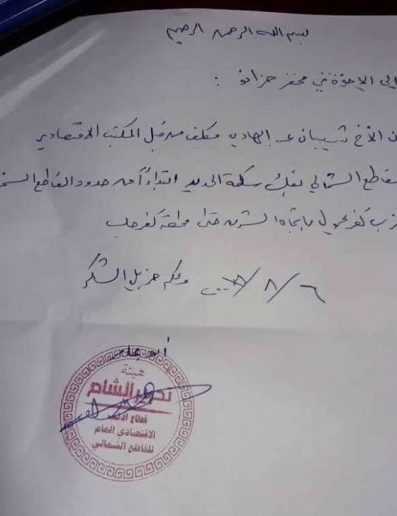Summary:
In September and October 2018, several public facilities and properties in Idlib Province were seized and robbed by the armed opposition groups in control of the area, especially by Hayat Tahrir al-Sham/HTS[1], which aimed to either turn the facilities into military posts or to rob the properties and resell the stolen items a new, according to a number of testimonies obtained by Syrians for Truth and Justice/STJ.
On October 2, 2018, the HTS-affiliated militants embarked on digging a tunnel in search of the oil pipelines, located in the suburbs of Saraqib City. Being conducted in daylight, this operation was witnessed by the area’s locals, after which the extracted pipelines were sent to the city of Sarmada, rural Idlib, and next to areas in Aleppo’s countryside, where they were to be sold.
On September 14, 2018, HTS-affiliated militants have also removed and dismantled the electrical and electronic devices they found at the Grain Bin Building, established in the city of Saraqib. They have even detached the ceilings and the walls, which they transported for resell, given that these grain bins are of the most important storage houses used for preserving grains in Idlib province, according to several eyewitnesses.
In September 2018, the city of Saraqib bore witness to another digging operation by HTS’ militants, who this time aimed at removing the major fiber-optic cable in the city and selling it, too. It is worth mentioning that this cable is the one feeding the telephone unit in the city of Saraqib while it connects the city’s post office with other offices in the province, in addition to the services of internet and telecommunication within the city and with other provinces, which are totally reliant on the same cable.
Stopping not at this point, the militants of HTS have on August 6, 2018, seized and dismantled the railroad, connecting the provinces of Aleppo and Latakia and Aleppo and Hama, which is both a commercial route and a means of transportation. The militants sold the railroad on the public markets later on for prices ranging between 225 and 300 Syrian Pounds per kilogram of steel, according to eyewitnesses and a number of testimonies obtained by STJ.
The robberies and pillages, STJ’s field researcher said, triggered a wave of contempt among several of Idlib Province’s residents, who cannot combat HTS’ practices, as they fear arrest.
In October 2018, HTS has seized and confiscated more than ten houses in the city of Kafr Zita, northern rural Aleppo, the ownership of which belongs to Syrian Government loyalists. Over the same month, HTS has also seized the building of the city’s Cultural Center and an emergency center used by the Syria Civil Defense/White Helmets, offering no reason for the confiscation process to the date.[2]
This was not HTS’ first act of confiscation, for the armed opposition group has put its hand on public and privately-owned properties in Idlib Province. In late 2017, HTS has taken over numerous civil and service departments in the city of Saraqib, rural Idlib, including the Water Unit, the potato market and the real estate and civil registry departments, incidents that STJ covered in a former report.[3]
These violations were not committed solely by HTS, for the National Front for Liberation/NFL has also embarked on similar acts. On the morning of September 5, 2018, the latter blew up the al-Tuwayni Bridge, which connects the armed opposition groups-held al-Tuwayni Village with the two villages of al-Hurah and al-Khandaq, north-western Hama that are controlled by the Syrian regular forces. On August 31, 2018, the NFL also detonated the Beit al-Ras Bridge, located between the armed opposition groups-controlled village of Beit al-Ras and that of al-Jayyid, taken over by the Syrian regular forces, and the al-Sharia Bridge, which links the village of al-Sharia with the Syrian regular forces-held al-Karim Village.[4]
1. HTS Digs down seeking Oil Pipelines in Saraqib, which it Plans to Dismantle and Sell:
On October 2, 2018, HTS started digging down and tracking the oil pipelines constructed in the suburbs of the city of Saraqib. It then transported the pipelines to the Industrial Area in Idlib Province, where they were renovated and sent to the city of Sarmada, rural Idlib. From the latter city, the pipelines were next transferred to rural Aleppo, where they were to be sold. This incident was accentuated by several of Saraqib City’s residents, who bore witness to the digging process. Commenting on this, one of the city’s residents recounted the following to STJ:
“HTS rented machinery to dig down and search for the oil pipelines in the area of Tal Ar-Rumman, south of Saraqib City, and the northern and western parts of the Aleppo-Latakia International Highway. On October 2, 2018, the HTS-affiliated militants embarked on the digging process in daylight before the locals’ eyes. They removed the pipelines. Later on, we came to know that they have sent the pipes to the Industrial Area for recycling, from where they were meant to be shipped to the border areas with Sarmada or rural Aleppo to be sold on the markets there. We, the people of Saraqib, condemn HTS’ practices and hold it accountable for this, for these properties belong to the public. For sure, none of the residents could protest against HTS’ deeds, especially since they fear the arrests it proceeds on, which are usually based on ready-made charges. HTS usually accuses arrestees of being secular or of drug abuse, which happened lately with people from Saraqib City —Mohammad al-Rashideh and Abu Ali, who were detained for 24 hours for refuting HTS’ policy. They were subjected to brutal beating by the HTS militants and then coerced into signing pledges that they are not to tell anything they were made to experience or else they will be liable to arrest again.”
In another testimony, a Saraqib-based activist told STJ that HTS is still seeking to impose its control on the city’s vital joints, especially since it seized the Post and Communication Office and held reins to the Water Unit of the city in July 2018, pointing out that militants of HTS did not stop here, for in early October 2018, they dismantled the oil pipelines passing through Saraqib City and sold them on the markets, adding that the value of the removed pipes is estimated at about 5 million Syrian Pounds. The witness continued to say that the militants are still searching for the pipelines constructed in the rest of the areas to the date this report was written —November 8, 2018.

A number of trucks transporting the oil pipes dismantled by HTS, which the latter sold to merchants in the city of Sarmada, rural Idlib. Taken on: October 13, 2018. Photo credit: STJ.
2. HTS Turns Saraqib’s Grain Bin Building into a Military Post and then Robs it:
In September 2018, militants of HTS dismantled the walls and ceilings of the Grain Bin Building, south of Saraqib City[5], which is considered the major storage place where grains are preserved by the Syrian Interim Government-affiliated Directorate of Agriculture in Idlib Province. In July 2018, HTS has made a military post of the building and emptied the bins of the grains they contained. On September 14, 2018, a group of its militants started removing the electrical and electronic devices inside the bins; they have even dismantled the walls and ceilings as to transport them for sale. Commenting on this, one of the agricultural engineers, who used to work at the Grain Bin Building, narrated the following to STJ:
“In the grain bins, about 400 tons of grain were stored, given their capacity at storing huge amounts of harvest. Today, however, they stand there as mere buildings of concrete after HTS has dismantled their electrical and electronic devices, in addition to the ceilings and walls. They removed these parts to sell them to scrap merchants.”
In another testimony, Mohammad Obaid, also an agricultural engineer from the city of Saraqib, said that the grain bins were lately turned into a military post, controlled by HTS, after it removed most of the bins’ electrical and electronic devices and sold them to merchants, in addition to sending a part of these devices to the Syrian regular forces’ control areas in Hama Province, where they will be traded for higher prices. He said:
“HTS continues to remove the remaining electrical and electronic devices, in addition to the steel found in the Grain Bin Building to send them to the scrap market, where they are to be sold. It seems that violations against public property have become the armed opposition group’s easiest way to make effortless money. The condition is growing more difficult, especially since these violations are aimed at the public’s possessions without censorship or protection from any side in Idlib Province.”
3. Searching for the Fiber-optic Cable and Seizing it in Saraqib:
In September 2018 as well, HTS’ militants in the city of Saraqib embarked on digging operations in the surrounding of the city to locate the fiber-optic cable, the main cable that feeds the Telephone Unit in Saraqib city and connects its Post Office with other offices throughout the province, not to mention that the cable itself is responsible for providing the services of internet and telecommunication within the province and external ones, with the rest of the Syrian provinces. The militants removed the cable and sold it to merchants, as it is made of brass. The incident was witnessed by the majority of the city’s locals. On July 30, 2018, HTS has also took over the city’s Post Office and Telephone Unit. On this note, one of the employees at Saraqib City’s Post Office, said:
“The fiber-optic cable, is one of the key cables that connect the Post Office in the city of Saraqib with the rest of the offices in most of the [Syrian] provinces. After the cable was severed, the calls were limited to Idlib Province only. The fiber-optic cable or the axial is the principal line through which the office is provided with internet. Later on, we came to know that after it was cut, the fiber-optic cable was sent to the regime-held areas in Hama Province with the help of merchants that transport and trade with commodities.”

HTS-affiliated machinery digging in search of the fiber-optic cable in Saraqib City on September 9, 2018. Photo credit: STJ.
4. Railroad Connecting Idlib and Aleppo Seized, Dismantled and Sold:
In August 2018, even the Aleppo-Latakia/Aleppo-Hama railroad, which is considered a trade route and a transportation means, did not survive the acts of confiscation and seizure committed by HTS. On August 6, the latter sent a circular to the Police Department at the Hazano Town[6], rural Idlib, tasking a person called Shayban Abdulhadi with dismantling the railroad starting from the section located to the west of Kafr Yahmul Town, rural Idlib, towards the east, as far as the Kafr Halab Station, rural Aleppo. The leaked circular gave rise to the indignation of the area’s locals. The local councils in rural Idlib, for their part, expressed total refusal of the circular, considering any damage made to the railroad a violation and a confiscation of public property. One of rural Idlib’s residents, a worker at the Railroad Corporation, told STJ the following:
“We have spent about seven years in the service of the Railroad Corporation and renovating the railway connecting Idlib with Aleppo, as to mitigate the difficulties we had to go through upon walking dozens of kilometers, given that these efforts were made at a time when we lacked the slightest resources. We played the engineer, the worker and the driver. Sometimes we had to transport the iron bars of the railroad on shoulders for long distances. Today, as simple as that, armed groups of HTS confiscate the railroad, dismantle it and sell its pieces in the market for prices ranging from 225 to 300 Syrian Pounds per kilogram of steel. Have we really reached this level, where thefts are committed so openly, without any one to stop the robberies aimed at the public properties?”
Imad Kurunful, director of the Service Office under the Local Council in Kafr Yahmul, rural Idlib, informed STJ that the decision to dismantle the railroad by HTS triggered the anger of locals and the civil society organizations once a photo of the circular, issued by HTS on August 6, 2018, was leaked. In response, the locals held a meeting on August 20, 2019, to make a statement, the content of which was both a warning and an expression of condemnation. He added:
“There was an agreement to set up a plan, under which the town’s locals were to gather at the areas were HTS has been committing acts of sabotage, seeking to combat any group that would approach the railroad or any of the town’s other public properties. In addition to this, a committee was to be found, consisting of the town’s dignitaries and sheikhs to negotiate and reach an agreement with the armed group that is inflicting damage upon infrastructure, regardless of its type. This sought to avoid any armed clashes between the two sides and to prevent the armed groups, operating in the town, from intervening. We will not allow any side, which ever it is, to get close to the public properties, which ownership belongs to all members of the Syrian people.”

A photo of the circular issued by HTS on August 6, 2018, providing for the dismantling of the railroad between the two provinces of Aleppo and Idlib. Photo credit: Idlib-based activists.
[1] On January 28, 2017, several jihadist factions in Syria’s north announced integration under “Hay’at Tahrir al-Sham/HTS”. The factions that dissolved themselves and joined together under the new name were (Jabhat Fatah al-Sham-previously known as al-Nusra Front- Nour al-Din al-Zenki Movement, Liwa al-Haqq, Ansar al-Din Front, al-Sunna Army). Nonetheless and due to the confrontations that broke out between the Ahrar al-Sham Movement and HTS on July 15, 2017, the Nour al-Din al-Zenki Movement announced its separation from HTS on July 20, 2017.
[2] “Hama: Hayat Tahrir al-Sham Seizes Houses and Public Buildings in Kafr Zita.” STJ, October 26, 2018. Last visited: November 12, 2019. https://stj-sy.org/en/894/.
[3] “Hayat Tahrir al-Sham/HTS Impose Control over Service and Civil Institutions in Saraqib City, Idlib Countryside.” STJ, December 25, 2017. Last visited: November 12, 2019. https://stj-sy.org/en/369/.
[4] “Rebels Damage and Misuse Public Facilities.” STJ, September 6, 2018. Last visited: November 12, 2019. https://stj-sy.org/en/727/.
[5] The HTS took over the city of Saraqib on November 8, 2018.
[6] The town of Hazano is control by the HTS.

